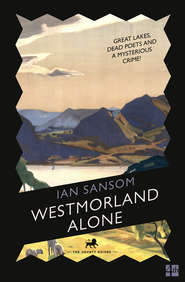По всем вопросам обращайтесь на: info@litportal.ru
(©) 2003-2024.
✖
The Norfolk Mystery
Автор
Год написания книги
2019
Настройки чтения
Размер шрифта
Высота строк
Поля
‘Yes, sir.’
‘She’s rather eccentric and strong-willed, I’m afraid.’
‘That’s … perhaps one way of describing it, sir, yes.’
‘Yes. Women are essentially wild animals, Sefton. That’s what you have to remember.’
‘Well …’
‘Untameable,’ he said. ‘Not like these.’ He stroked a terrier at his side, gestured at the bird, the cats. The peacock. ‘And what with the bobbed hair, I have to say, about as unlovely as a docked horse. After her mother died – my wife – we tried her at a convent school in Belgium. No good. No good at all. Wild animals,’ he repeated. ‘Scientifically proven, Sefton. I’ve made quite a study of animal behaviour, you know.’
‘Yes, I was … admiring your …’
‘Menagerie?’
‘Yes. And the aquarium. On the way in.’
‘Good. Yes. We’ve an aviary as well. And a terrarium, of course. And then there’s the farm. Model farm only. But. You’re familiar with ethology, Sefton?’
‘I don’t think I am, actually, sir, no.’
‘Sit down, sit down. No need to stand on ceremony now.’ I perched precariously on a round-backed chair by the table, its wicker seat half caved in and piled with books. ‘Ethology,’ continued Morley. ‘Study of gestures, Sefton. Or rather, interpretation of character through the study of gesture. Applies in particular to animal behaviour.’
As usual, I wasn’t sure if I was expected to answer, or to listen. But then Morley went on, kindly resolving my dilemma for me.
‘Can also be applied to humans, of course. So you’d have to ask, what was she signalling to you?’
‘Who, sir?’
‘My daughter, Sefton. She’s told me all about it. The journey.’
‘I see, sir.’
‘This is where our friend Herr Freud goes wrong, I believe. Confusing mental qualities with behaviour. Most of our fraying is a kind of animal suffering, you see. I do wish psychoanalysts would spend more time studying animal communication.’
‘I’m afraid I don’t quite—’
‘I’ll be honest with you, Sefton. You’ll need to watch her carefully. Attend to her gestures. And the eyes – everything is in the eyes. The face, as you know, speaks for us. We must learn to read it. Which is becoming more difficult all the time. With women’s faces, I mean. Foreheads tightened. Creases erased. Extraordinary. You’ve read about this? Young women having their bosoms unloaded and … uploaded? American, of course. Jewesses do it with their noses, I believe. Dreadful. Nothing to be ashamed of, surely? And many women now of course supporting their entire families, you know. Businesswomen. Materfamilias. Noblesse industrielle. Waitresses in dinner jackets in London – it’s a fashion from France.’
‘Is it, sir?’
‘The feminine question, it seems, no longer requires a masculine answer, Sefton.’
As usual, Morley’s mind seemed to be spinning up and around and away from the conversation into realms where it was difficult to follow. Fortunately, he brought himself back down to earth – I was far too tired to have tried dragging him down myself.
‘Anyway, we’re setting off tomorrow, Sefton.’
‘Tomorrow, sir?’
‘Yes. Research for the first book. The County Guides. Remember? Book one. Numero uno. Un. Eins. In Polish, do you know?’
‘No, I’m afraid …’
‘Numbers one to ten, in the major Indo-European languages? Essential knowledge, I would have thought, for every man, woman and child in this day and age.’
‘No, I’m afraid I … Jeden?’ I hazarded a guess.
‘Excellent!’ said Morley. ‘I knew I’d made the right choice with you, Sefton.’
I silently thanked my father for all the ambassadors who’d trooped through our drawing room all those years ago, jabbering in their languages and teaching us children cards, much to my mother’s dismay.
‘Anyway, all the arrangements have been made. You’ll have the cottage on your return, but for tonight you have a room upstairs. The upper room. I hope it’s sufficient.’
‘I’m sure it’ll be more than sufficient, sir.’
‘Good. And there’s no need to call me sir.’
‘Very well, sir.’
‘You may call me Mr Morley.’
‘Very good, Mr Morley.’
‘We’ll be leaving by 7 a.m. I like to get an early start. Now. You’ll be wanting some supper?’
‘Well …’
‘The maid has set something out in your room, I think. You’re not a vegetarian?’
‘No.’
‘Marvellous. All very well for Hindus, for whom I have the very greatest respect, I should say. But, the boiled beef of England, isn’t it? Cold meats for you, mostly, I think. Seed cake. You know the sort of thing. And you’re travelling light, I see. Good good. Russian tea?’ he asked, indicating a tall glass of brackish-looking liquid by the typewriter, which one might have mistaken for typewriter fuel. ‘I developed a passion for it after my time in Russia.’
‘No. I’m fine, thank you.’
‘Well, good. That’s us then. You go on ahead. Make yourself at home. I’ve an article to finish here. Chronicle. On the history of the folk harp. Fascinating subject. One can see in its history the spread of certain common craft skills across civilisations. I’ll see you first thing.’
‘Certainly.’ I made back towards the door, avoiding animals, in the hope of finding my room without further adventure. ‘Just one question, Mr Morley, if I may.’
‘Yes. Of course, Sefton.’
‘Which county will we be beginning with tomorrow, sir?’
‘I thought we’d start close to home, Sefton. With God’s own county.’
‘Yorkshire?’
‘Norfolk. “I am a Norfolk man and glory in being so.” Who said that, Sefton?’











